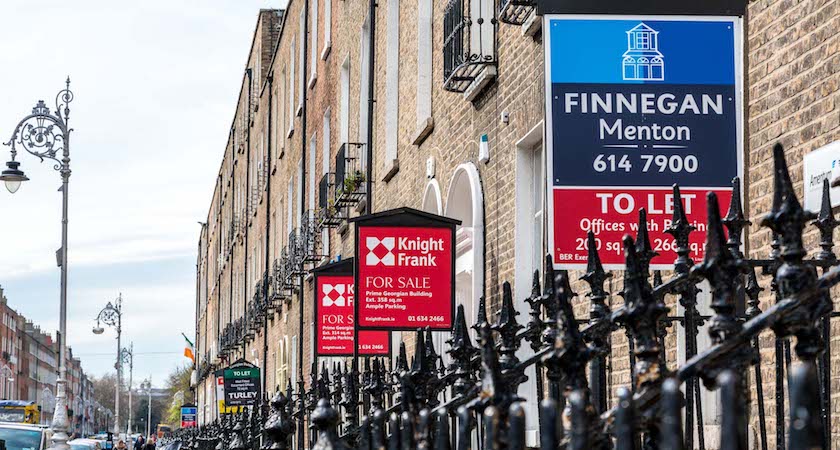Economic crashes are not easy things to predict – warnings can be wrong for many years before they are proven right.
But the current economic situation in Britain has many warning signs of an approaching cliff’s edge.
A property crash in London would have significant effects upon Ireland.
I remember my late father being looked at as if he had two heads for warning anyone who would listen of an impending and cataclysmic property crash in Ireland in the mid-2000s.
The few who heeded him were saved from financial disaster, but others believed the Government’s and the banks’ assertion that the ‘fundamentals were sound’.
I wonder would he be saying similar things about London’s property market right now.
Consumer confidence in Britain is dropping, and a political vacuum exists. Higher taxes and stamp duty have hit demand for second homes and buy-to-lets.
Nationwide building society has revealed three consecutive months of house price drops; the first time that has happened since before the financial crisis.
If a property crash is on its way, we might see an economic catastrophe in Britain, which will not spare Ireland.
A recent GMB Union study calculated that average house prices in London are 14 times average annual earnings for a London worker.
To put that in context, most banks and building societies will not lend more than 4.5 times annual income. In Westminster, the figure is 25 times average earnings. This is simply unsustainable.
No city can function when necessary workers cannot live in the city, nor even afford to commute in from the sorts of places in which they are now forced to live.
With a shocking dearth of social housing, and regular inflation-busting rail fare hikes, a tipping point is coming. Who will serve the coffees, staff the hospitals, or clean the offices?
Plus, of course, there’s Brexit. The fall in sterling since the referendum has made property more attractive to foreign buyers wanting a safe harbour for their money.
 It’s possible that any crash won’t materialise for two or three years. If so, it might give Ireland an opportunity to think hard about how best to protect itself. (Picture: iStock)
It’s possible that any crash won’t materialise for two or three years. If so, it might give Ireland an opportunity to think hard about how best to protect itself. (Picture: iStock)But inflation means interest rate rises are coming – the Bank of England monetary policy committee is leaning that way - with mortgages set to become more expensive.
Brexit has led people and firms to reassess their future in Britain, with the knock-on effects that will have for property demand.
Some argue that demand outstrips supply by so much that prices won’t crash, just level off.
There is certainly a chronic housing shortage, and this will feed into the way the situation resolves itself.
It might be the case that trophy properties in prime central London will hold up because many view Britain as a stable country in which to park money (or, as is often the case, launder money).
But it all sounds like the familiar refrain which always precedes asset bubbles bursting - “it’s different this time!”
We heard it prior to the Irish crash of 2008 and the London crash of the late ‘80s.
Even ultra-wealthy people can panic-sell, or decide to get out at the top and look for other “safe havens”.
Residential property in South-East England, even with the supply shortfall, is so ludicrously overpriced that something must give.
What truly is different this time is the height from which the fall would take place.
There should have been a bigger British property crash in 2008, just as the 2001 downturn was shortened by pump-priming the American property market (which made the eventual 2007-2008 collapse even more damaging).
The British economy has been propped up by low interest rates and over-priced property, both residential and commercial.
If there is a crash, it will take the entire British economy with it, and that will inevitably have negative consequences for Ireland’s economy.
Ireland is in an economically precarious position. Though there is a nascent recovery, Ireland has only just begun wading out of a lost decade.
The inherent contradiction in the Eurozone which caused the Euro crisis in the first half of the decade will occur again.
Brexit, particularly if it involves leaving the Single Market and Customs Union, will hit Irish trade hard.
Exposure of Irish banks and pension funds to British property is a concern (Bank of Ireland has more than €5bn, AIB €3bn, in loans tied up in Britain property, and 40 per cent of Bank of Ireland’s assets are British-based).
There was concern about the commercial property market even prior to Brexit – now many companies are transferring to Frankfurt and Dublin and the outlook seems bleaker.
Some analysts predict at least a 20 per cent fall in office prices.
The property market in Britain might survive without a significant correction in prices for years to come – not that this would be welcome news to the generation for whom home-ownership seems like an impossible fantasy.
Any fall might be offset by the shortfall in residential supply.
Yet it all feels too similar to the cocksure mantras of the property hawks before the 1980s crash and in Bertie Ahern-era Ireland.
Thomas Gilmartin is a second generation Irish writer living in London, who has lived in both Britain and Ireland. He specialises in current affairs, law, and international relations.


